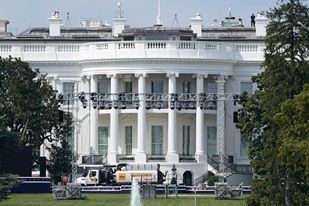The White House is stepping up pressure on lawmakers to renew a section of electronic surveillance law which permits the government to conduct targeted surveillance of foreign persons located outside the US.
The provision, known as section 702 of the Foreign Intelligence Surveillance Act (Fisa), is set to expire at the end of the year. But its renewal is facing pushback from privacy advocates and lawmakers, some citing examples in which law enforcement search requests were misused to conduct illegal surveillance on US citizens.
Recently, Joe Biden’s administration circulated examples showing the US had used electronic surveillance under section 702 to catch fentanyl smugglers as well as the ransomware hackers who temporarily shut down the Colonial Pipeline Company in a 2021 cyber-attack that led to gas shortages along the eastern seaboard. The public campaign to build support for the provision comes as a poll released last week showed that the public is growing more sceptical of the need to sacrifice civil liberties for security.
The Associated Press-NORC Center for Public Affairs Research poll released last week found that 28% of adults support the government listening to phone calls and emails made outside the US without a warrant while 44% oppose the practice.
More broadly, 48% of Americans said they believe it is necessary to sacrifice their rights and freedoms to prevent terrorism, down from 54% in 2021 and nearly two-thirds in 2011, a decade after the 9/11 attacks.
The decline in support for foreign surveillance was notably sharp among Republicans, with just 44% saying that it is sometimes necessary compared with 69% in 2011. Among Democrats, support remained relatively constant, dropping to 55% from 59% in 2011.
Republican opposition to the renewal of section 702 in some cases has responded to the failure of the FBI to clearly identify the Steele dossier – also known as the Trump–Russia dossier – as a political opposition research report without merit.
Ahead of a Senate hearing into the issue on Tuesday, South Carolina senator Lindsey Graham – the top Republican on the judiciary committee – said the FBI’s mistakes had damaged its reputation with Congress and the public. Nonetheless, Graham insisted that section 702 should be reauthorized.
“What I’m trying to tell my constituents back home [is] the threats to the country are growing – they’re not lessening,” Graham said. “Bottom line is: let’s reauthorize this program and build in some safeguards.” Illinois’s Democratic US senator Dick Durbin, the panel’s chairman, said he’d need to “see more” of the FBI’s current reforms to support the provision’s renewal.
But civil liberties groups have come out strongly against reauthorization, which is required every five years. “Although purportedly targeted at foreigners, section 702 has become a rich source of warrantless government access to Americans’ phone calls, texts, and emails,” the Brennan Center for Justice, one of 21 civil liberties groups, said in a letter opposing the renewal of section 702.








